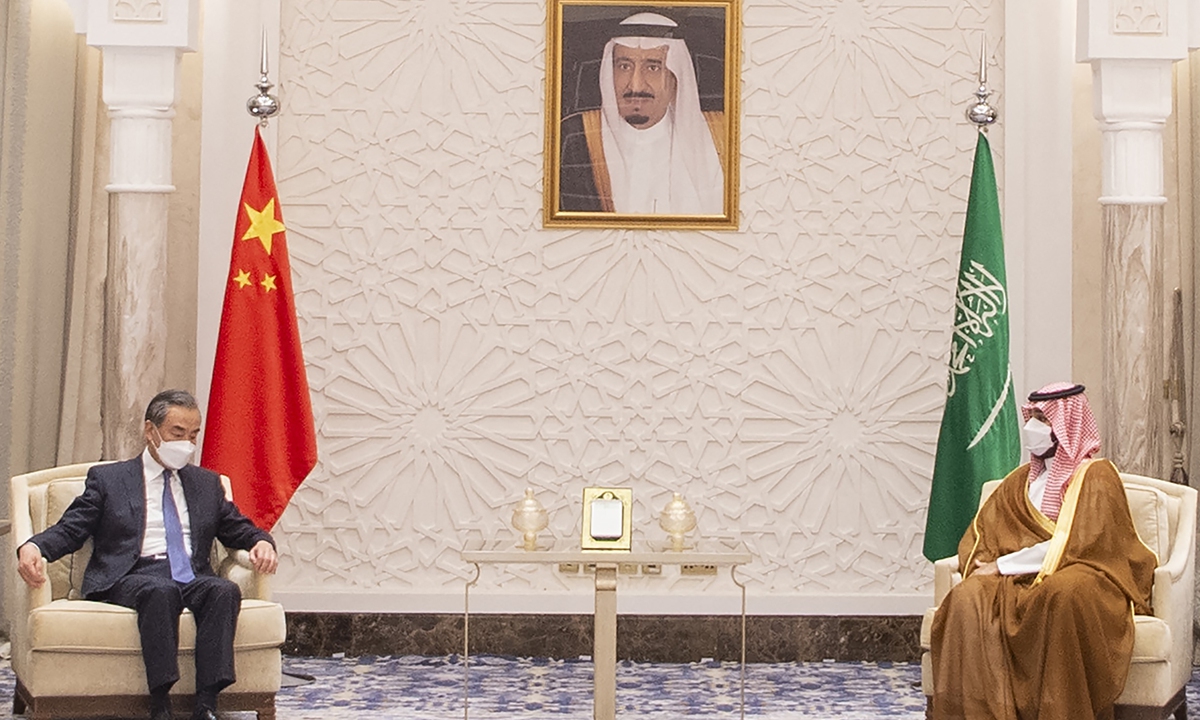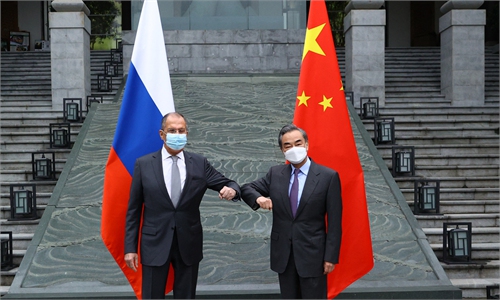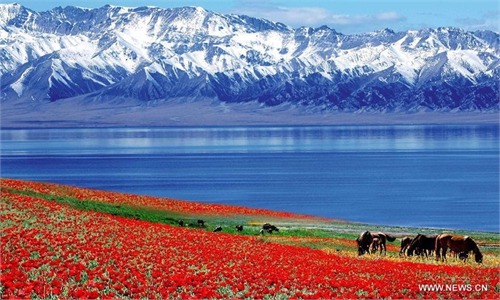Mideast states back China’s Xinjiang stance
West’s human rights concerns hypocritical: experts

Chinese State Councilor and Foreign Minister Wang Yi (left), meeting with Saudi Arabian Crown Prince Mohammed bin Salman, in the capital Riyadh, on March 24, 2021.
Soon after the China-US Alaska talks and China-Russia Guilin talks, Chinese State Councilor and Foreign Minister Wang Yi kicked off his visit to six Middle East countries. During Wang's first stop, Saudi Arabia expressed support for China on Wednesday, opposing Western forces driving a wedge between China and the Islamic world and backing China's legitimate position on the affairs related to Xinjiang and Hong Kong.
Although the US administration is trying to form an anti-China alliance with a few Western countries under the human rights banner, experts said that support from Islamic countries, including Saudi Arabia, proves that the so-called concern of the Western countries over China's Xinjiang Uygur Autonomous Region is hypocritical, with an aim to politically suppress China, and it has nothing to do with human rights or religion.
Wang Yi's visit not only demonstrates the importance China has always attached to the Middle East, but also reflects the rising status of the region in China's diplomatic map, which will elevate China-Middle East relations to a new level, the experts said.
Wang and Saudi Arabia's Crown Prince Mohammed bin Salman bin Abdulaziz Al Saud on Wednesday agreed to oppose any interference in the internal affairs of other countries and defend the interests of the developing countries, the Xinhua News Agency reported.
Mohammed said Saudi Arabia firmly supports China's legitimate position on affairs related to Xinjiang and Hong Kong, opposes interference in China's internal affairs under any pretext, and rejects the attempt by certain parties to sow dissent between China and the Islamic world, Xinhua reported.
On Thursday, Wang held talks with Turkish Foreign Minister Mevlut Cavusoglu in Ankara. The Turkish Foreign Ministry said regional and international issues as well as bilateral relations will be discussed, the Reuters reported.
At the invitation of Wang's counterparts of the six countries in the region, Wang is scheduled for official visits to Saudi Arabia, Turkey, Iran, the United Arab Emirates and Bahrain, and a working visit to Oman from March 24 to 30.
Hua Chunying, spokesperson for the Chinese Ministry of Foreign Affairs, said on Wednesday at a press conference that with the spread of the epidemic, ongoing instabilities and recurring hotspots in the Middle East, countries in this region hope to enhance anti-epidemic and development cooperation and deepen exchanges on state governance with China, and hope that China will play a bigger role in regional affairs.
Zhu Weilie, the director of the Middle East Studies Institute of the Shanghai International Studies University, told Global Times on Thursday that Wang's visit would put a strain on the US and its allies, but the visit aims to seek development cooperation rather than counter the Western alliance.
Cooperation in petroleum and new energy supplies, high-quality Belt and Road Initiative, vaccines, anti-terrorism and anti-separatism, as well as regional security, may be the topics, Zhu said.
The traditional pattern of the Middle East dominated by the US has changed and some countries in the region are no longer blindly following the US, and their support for China on Xinjiang affairs is the evidence, Zhu said.
Zhu pointed out that the support, and also their cultural and religious closeness with Xinjiang, has shown that the so-called concern from the West is hypocritical and has nothing to do with human rights and religion.
Members of a delegation of 20 Arab countries and the Arab Leaguevisited Xinjiang last year. They positively evaluated human rights developments there, saying the Uygurs in China are treated very well, Zhu said.
Wang said on Tuesday at a meeting with Russian Foreign Minister Sergei Lavrov in Guilin, South China's Guangxi Zhuang Autonomous Region that over 80 countries jointly or separately voiced support for China's stance on Xinjiang affairs at the United Nations Human Rights Council (UNHRC), which says enough about which side justice is on, and certain Western forces' manipulation does not represent the international community.
At least a dozen Islamic states including Pakistan, Iran, Syria, United Arab Emirates, Oman and Egypt in recent years have voiced to the UNHRC their high acknowledgement and praise of China's achievements in human rights and in combating terrorism and de-extremism in the Xinjiang Uygur Autonomous Region .




